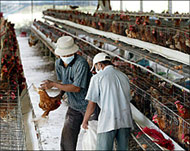Thailand reports first bird flu death
As bird flu spreads deeper into Asia, including Pakistan, Thailand says five people suspected of contracting it have died.

Thailand’s health department said on Monday there were 10 suspected cases, including five children.
Officials were waiting for laboratory test results to confirm or deny their fears.
Earlier, Thailand said the bird flu virus claimed its first human victim there, a six-year-old boy who caught a disease that was creating fears reminiscent of SARS.
The country had expanded the number of bird flu crisis zones from two to 10 of the country’s 76.
The Thai boy’s death means all but one of at least seven human bird flu victims have been children, leaving scientists trying to figure out why the young are so vulnerable. The other six victims were all in Vietnam.
Thailand’s first confirmed death from bird flu came within hours of Indonesia announcing an outbreak of some strains of the flu across the sprawling archipelago.
The Bangkok government, under attack from the opposition and newspapers accusing it of covering up the outbreak for weeks while saying it was fighting fowl cholera, has sent troops and prisoners to help with the slaughter.
All chickens within five kilometres of an outbreak will be killed, mostly by tying them up in fertiliser sacks and burying them alive. Officials, however, will not say how many outbreaks they are fighting.
WHO fears
The disease has also struck in Taiwan, Japan, South Korea, Vietnam and Cambodia with a rapidity the World Health Organisation (WHO) calls “historically unprecedented”.
Pakistan also announced it had detected avian influenza among chickens in the southern port city of Karachi, but there was no evidence yet that it had infected humans.
The WHO fears it will mutate, link up with ordinary influenza and foster the next flu pandemic among humans with no immunity to it.
“We don’t know how this virus is spreading and so it’s safe to presume that nowhere can consider itself safe,” WHO spokesman Peter Cordingley said in Manila.
WHO said it had no evidence so far of person-to-person transmission of the virus.
Millions of hens have been slaughtered to contain the virus, especially in Thailand, which raises one billion chickens a year and is the world’s fourth biggest poultry exporter.
Pakistan
Pakistan said on Monday it had also detected avian influenza among chickens in the southern port city of Karachi, but there was no evidence yet that it has infected humans.
“Yes, avian influenza has been detected in chickens in Karachi poultry farms,” Saleem Khan, provincial director for livestock at the agriculture ministry, told Reuters.
Indonesia said it had found no evidence the disease had spread to humans, the great fear echoing from last year’s outbreak of Severe Acute Respiratory Syndrome, another disease that crossed the species barrier from animals to humans.
 |
|
Workers stuff chickens into a sack |
Before SARS was contained, nearly 800 people had died across the world after the first outbreak in southern China.
Indonesia had said it was free of bird flu and blamed the deaths of thousands of chickens in parts of East Java and the tourist centre of Bali on Newcastle disease, a virus harmless to humans.
Senior Agriculture Ministry official Sofjan Sudardjat said about 40% of the 4.7 million chickens- 5% of the country’s hen population – which had died since November were infected both with avian influenza and Newcastle disease.
Sudardjat said the flu had hit almost all of the sprawling archipelago and experts would carry out tests on Wednesday to identify the type of disease and level of danger to humans.
Experts say chicken and eggs cooked properly are not dangerous to humans.